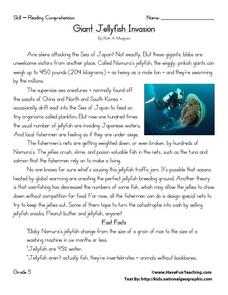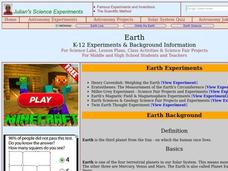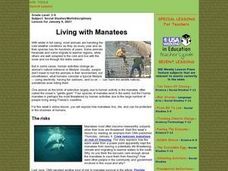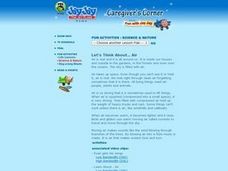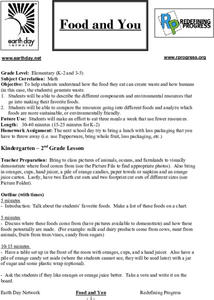Curated OER
Corridor of Time Fieldtrip Worksheet and Explorers Heritage Center History Hunt
In this Corridor of Time and Explorers Heritage Center learning exercise, students respond to 29 short answer and fill in the blank questions regarding information presented in the North Dakota Heritage Center.
Curated OER
Climate Change Quiz
In these climate change worksheets, learners read through the fourteen questions about climate change. Students select the correct answer to complete the quiz.
Curated OER
Reading- Whales (Online Interactive)
In this whales worksheet, students read a short text and learn about different kinds of whales. Students then read 8 sentences and answer "yes" or "no". This is an online interactive worksheet.
Curated OER
Giant Jellyfish Invasion
In this reading comprehension skills instructional activity, students read a 1 page selection entitled "Giant Jellyfish Invasion" and then respond to 5 multiple choice questions.
Curated OER
Orca United Nations
Students study the differences between sets of data and explain how organisms are adapted to their environment. In this marine mammals lesson students analyze data based on set criteria.
Curated OER
Global Warming
In this global warming worksheet, students complete multiple choice questions about global warming. Students complete 5 questions total.
Curated OER
Nowhere to Run
In this environmental science instructional activity, students explore the different climate change around the world and summarize them. They fill in the table provided.
Curated OER
Water Pollution
Students explore the causes of water pollution. In this environmental lesson, students conduct experiments with natural filtration systems.
Curated OER
Earth
Students study the earth in relation to the solar system. In this planetary lesson plan students complete several investigations into the measurement of the earth and its magnetic field.
Curated OER
Don't Marry the Mole!
Third graders examine the power of solar energy. In groups, they create their own pizza box solar oven to discover the power of the sun and how it is a source for heat and light. To end the lesson, they use the internet to examine...
Curated OER
Sharkland Wiki
Students, while researching the waters around southern Africa and viewing a video of the episode "Sharkland" from Thirteen's series NATURE, critique reliability of online resources and analyze the various components of a wiki. They...
Curated OER
Living with Manatees
Students research the lives of manatees and how humans are contributing to their survival. They visit a variety of websites including a webcam.
Curated OER
The Adventure of Echo the Bat
Pupils compare different habitats based on satellite imagery. They identify land features in the satellite imagery.
Curated OER
The Planet Earth
Learners explore the planet Earth, outer space, and Earth's axis. They demonstrate reading comprehension skills, including literal meaning, inference and critical analysis.
Curated OER
Survival in the Open Ocean
Students examine how scientists conduct pelagic research and identify pelagic predators as they study the open-ocean ecosystem. They discuss and conduct small group research of this environment in order to produce a presentation.
Curated OER
Let's Think About Air
Students explore the concept that air is all around us and identify ways that we can use air, and what air can do. They watch a short video that illustrates some of their findings.
Curated OER
Pollution Solution
Students explore the topic of oil pollution and how it affects the global ocean. They discuss oil spills in recent history and use problem solving skills to decide what strategies could be used to actually clean up an oil spill. Students...
Curated OER
Making a Food Web and Learning About Ecosystems
Third graders examine the difference between a food web and food chain. They also examine the importance of the sun in a food web and food chain. Students understand what happens when you remove parts of the chain.
Curated OER
Water Quality Monitoring
Students comprehend the four parameters of water quality. They perform tests for salinity, dissolved oxygen, pH and clarity or turbidity. Students comprehend why scientists and environmental managers monitor water uality and aquatic...
Curated OER
The Intertidal Zone: Tides and How Creatures Survive
For this intertidal zone worksheet, students study the various marine life creatures and list the characteristic that allows them to stay put in the intertidal zone. Students then draw or cut and paste the marine life and seaweed into...
Curated OER
Dino Detectives
As students examine maps of Utah, 4th graders search for clues about what prehistoric life was like in Utah.
Curated OER
Learning From Leaves: Adaptation Scavenger Hunt
Learners participate in an adaptation scavenger hunt at. They obtain various plant specimens, and sort the plants based on whether they came from a desert, tropical rainforest, or wetlands.
Curated OER
Jelly Critters
Students compare and contrast three different organisms that are considered gelatinous zooplankton. They describe how they fit into marine food webs.
Curated OER
Food and You
Students examine the types of foods they eat. They describe the different components and resources that go into making their favorite foods. They also compare the resources going into different foods and identify ones which are more...





